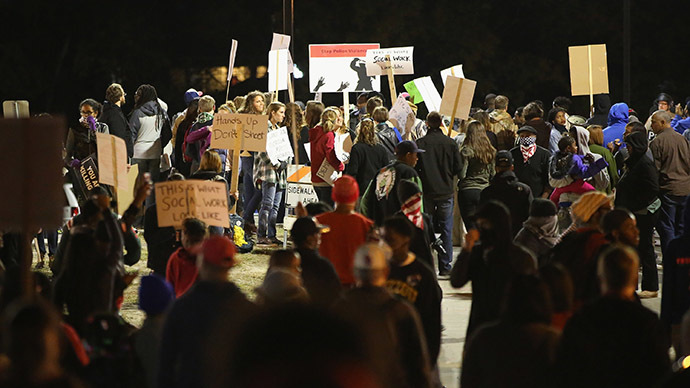States weigh police reform bills after fatal encounters

The deadly shooting of unarmed teenager Michael Brown in Ferguson, Missouri, last August has spawned more than 40 legislative proposals from lawmakers in the state, while several politicians elsewhere are pursuing bills in the wake of similar incidents.
The 114th United States Congress convened for the first time in Washington, DC, last week, and soon will start to weigh in on an array of bills on a federal level. Already, state lawmakers in at least a dozen states, according to the Associated Press, are considering potential legislation that can be regarded as direct responses to recent police officer-involved ordeals across the US in the same vain as a fatal encounter between Brown, 18, and a Ferguson, Missouri cop, Darren Wilson, last August.
The August shooting of Brown and an incident one month earlier in Staten Island in which local man Eric Garner died after being placed in a chokehold by a New York Police Department officer have both lent themselves to multiple legislative proposals in their respective states.
Among the more than 40 bills being considered in Missouri is a proposal to pay for body cameras for police offers by way of a new tax on gun and ammo sales. Also being considered are proposals for the adoption of new deadly force guidelines for officers, mandatory cultural diversity training for cops and restrictions on the amount of money municipalities in the The Show-Me State can raise from traffic fines and court costs.
As the epicenter for nationwide protests after Wilson fatally shot Brown in August, Missouri has become a hub for potential police reform as well, with AP reporting that more than 40 proposals have been introduced by the state legislature since August.
“I want to address some of the underlying building blocks that have caused this,” Missouri House Speaker John Diehl, a Republican, told AP.
“We’re not going into it with the assumption that we have to fix what the men and women on the front lines are doing. We’re not going to take away tools that they need to protect themselves.”
Meanwhile, states that were without high-profile police-involved incidents to the same degree – but were affected nonetheless as evidenced by months of protests from coast-to-coast demonstrations against unjust law enforcement policies and tactics – are weighing similar proposals as well.
Last Thursday, protesters rallied in the Maryland capital, Annapolis, urging lawmakers to adopt measures that would require police to wear body cameras, establish limits on the Law Enforcement Officers' Bill of Rights, create civilian review boards and establish an independent prosecutor's office to investigate cases of police brutality, according to the Maryland-based WBAL-TV.
“As legislators, lawmakers are walking in, you are not looking at gods in flesh. You are looking at everyday men and women,” the Rev. Heber Brown, an organizer, told the NBC-affiliated network. “When we engage our lawmakers about specific policy demands, do it in the spirit of courage.”
According to AP, the creation of external review boards is being considered also in Alabama and California, and in Virginia, the state’s General Assembly has already been asked to consider a bill that would require every State Trooper to wear a body camera while on the job.
“I think, in theory, they're a good idea,” Winchester Police Chief Kevin Sanzenbacher told regional news outlet Your 4 State. “We've spoken to some departments that have them, and what they've really found is that they reduce the number of complaints against officers.”
“[It’s important because of] issues like Ferguson, where you've got an officer saying one thing is happening and a number of witnesses whose reliability is in question,” Sanzenbacher said.
Similar proposals that would put body cameras on law enforcement officers or else implement now rules on existing programs are now being considered in Missouri, Utah and Rhode Island, according to AP, and New Jersey lawmakers may elect to create a task force that would oversee such a program in the Garden State; in Illinois, lawmakers are drafting a law to regulate the use of such technology, according to the Daily Northwestern.
In California, Assemblyman Reggie Jones-Sawyer, D-Los Angeles, who chairs the Legislative Black Caucus, told the Sacramento Bee that efforts to pass laws intended to curb officer-involved violence will likely be “the number one” public safety issue of the legislative session.
“It’s long overdue,” added Alice Huffman, president of the California NAACP. “It’s unfortunate that it took something like Ferguson to get this momentum going, but it’s very fortunate that people are now focused on it.”
In New Mexico, meanwhile, state lawmakers are expected to examine a bill on Tuesday this week that would, according to the Daily Times, increase the powers of citizen boards that review police conduct. Although it’s the only bill relating to law enforcement reform in that state, according to the paper, it isn’t being weighed without reason: last week, the district attorney in Albuquerque, NM filed murder charges against the two cops who shot fatally shot a homeless man in March 2014.
According to multicultural political news website, Politic365, members of the Black Caucus in the US Congress have offered eight proposals so far that aim to reform violent police behavior in the wake of the Ferguson incident.












